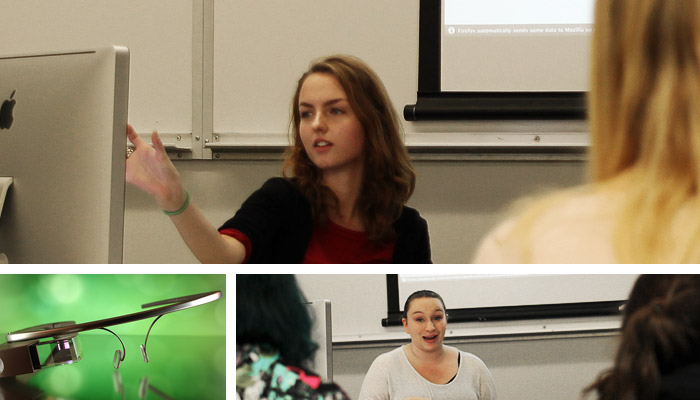
Next-generation eyewear, self-driving cars, balloon-powered wifi access, contact lenses capable of monitoring a diabetic’s glucose levels, and even the secret to immortality are a small sample of the audacious goals powered by today’s fascination with computing. Professor Jennifer Wood’s Core III class, Cyberculture and the Posthuman Age, provided context for these and other technological advancements for Scripps College students this fall.
Samantha Simon ’17 studied Google X, a division of the internet behemoth Google responsible for developing the Google Glass wearable computer, as well as other high-tech devices.”The Internet is ever-changing,” says Simon, a sophomore from Seattle, Washington. “It’s important to constantly keep up to date on new information because you never know what might happen next.”
That sentiment is echoed in the course’s mission statement: “identify the radical and controversial shifts the Internet era has brought about in a variety of areas: communication, politics, law and ethics, interpersonal relations, business, work, education, identity formation, and even brain function.” Given the breadth of its impact on the essential elements of our society, it’s difficult to imagine how one “studies” the Internet.
“Since I started teaching this course in 1999, the subject has obviously grown tremendously,” says Wood. “I think it’s particularly important to study and discuss more fully the ethical and legal issues related to the Internet. We need to consider our own actions as ethical and responsible cyber citizens and also how the actions of other users, and of organizations and governments, have an impact on our freedoms and security.”
Students taking part this semester focused on the growing influence of the online culture. In addition to Simon’s work, others reported on the importance of the Internet in building a robust self-publishing industry for writers and how the very definition of celebrity has shifted thanks to immediacy of information. Through it all, one common theme emerged.
“People would be surprised about how little time we as a society spend on the history of the Internet,” says Simon. “Instead, we tend to dive into current events and issues pertaining to the now instead of issues of greater importance, like online privacy.”
How would Wood respond to these concerns? Can Core III provide a suitable answer?
“Students now do not remember a pre-Internet time,” she says. “They have grown up with the Internet but lack a historical perspective on it. That is why spending time at the beginning of the course reading about the history of the Internet is critical. The overarching theme of Core (Histories of the Present) has been very good for this course because it formalizes what the goal of the course has always been – to see how the evolution of the Internet has had a profound effect on all aspects of our lives.”

